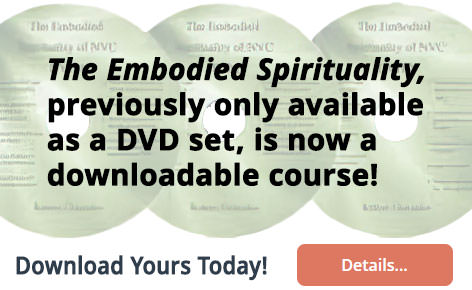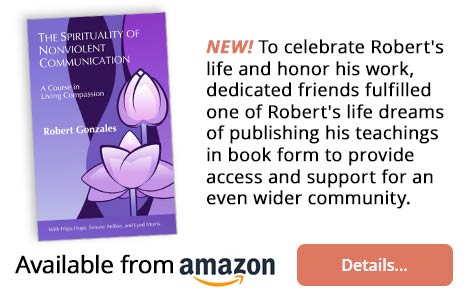

Welcome to the Robert Gonzales Training Legacy. Here you can learn more about Robert and the powerful teachings he dedicated his life to. NVC Academy is proud to house and share with you the complete body of his life's work. We invite you to explore, learn, and help keep his legacy alive!
Robert's passion was in the spirituality of the Nonviolent Communication (NVC) process. He saw NVC both as a process that helps people connect more authentically with themselves and others, and as a spiritual practice and way of living. The worldwide NVC community mourned when Robert died in 2021. He left behind a legacy of work that emerged from a lifetime of inquiry into the intersection between spirituality and human communication. More about Robert.
Article
4-6 minutes
We can see anger as an alarm or signal that can inform us that unmet needs require attention, or that we hold judgements. We can shift our own anger in several healthy ways: get present, identify the stimulus and any judgements or unmet needs, look for ways to meet our needs, make requests that support our needs, express our needs to ourselves and appropriate others, and more.
Details...Trainer Tip
1 - 2 minutes
Trainer Tip: It can be painful spending our days pretending we’re not who we are. For example, we may try not to be passionate in our expression because if we think its “too much” for people. This can lead to trying to figuratively to squeeze ourselves into small spaces in life. Alternatively, we can choose who to share our passion with, and speak our truth to. Today, notice what you need and to work actively to meet your needs.
Details...Practice Exercise
6 - 9 minutes
Is it tough to see a loved one go through hardship? May you have tension building up inside and draw a rigid boundary, or feel the urgency to swoop in and try to “rescue” them with advice, consoling, cheering up, analyzing, or explaining? Instead, relax your body. Invite your emotions to flow with acceptance. Notice inner peace and expansion. See this person as someone on a journey to awakening with all its painful and joyful twists and turns.
Details...Trainer Tip
1 - 2 minutes
Trainer Tip: Autonomy is not a need, but rather a way of living. We always have choices in life, even if none of them appeal to us. Becoming aware of our choices and taking responsibility for them leads to greater joy and empowerment.
Details...Video
6 minutes
Have you ever said 'I'm Sorry' to someone, only for it to leave you feeling disappointed and lacking connection? In some cultures, saying 'I'm sorry' has become too easy and is used for all sorts of situations. Whether it's just to excuse yourself as you pass in front of someone taking a photo, or if you've truly hurt a close friend. So when we really need to communicate regret, how can we do so in a way that acknowledges the situation and the connection?
Details...Trainer Tip
1 - 2 minutes
Trainer Tip: It can help us bring joy into our lives to connect to the needs we serve for doing things. While our activities may not always be fun, understanding their purpose and their value to our lives can help us shift the energy behind the action and have a more positive experience. Consider the underlying needs activities meet, and decide if they are worth it to you.
Details...Article
4-6 minutes
Even leaders we admire may exhibit behaviors that could be labeled as abusive, at least slightly. This includes not treating followers as equals, using charm, and hiding or twisting truth. In such scenarios a key reason for this is loneliness. If we're using our work and position primarily to gain for appreciation, acknowledgement, and acceptance then we need to examine our own loneliness. We need feedback to keep such conduct in check.
Details...Trainer Tip
1 - 2 minutes
Trainer Tip: Sometimes the expression of our needs can sound like demands or criticism. This can make it harder for people to want to contribute to us. Today, pay attention to how you express your needs. Find ways to release the emotional charge.
Details...Article
5 - 8 minutes
There's a danger in using empathy exchange to perpetually recirculate and exchange pain (often by telling and re-telling the same old stories), rather than using it as a catalyst for transformation. It can create and further pain in whatever form: anger, destructiveness, hatred, grief, emotional drama, and violence. It can also reinforce dualistic evaluations of "met" vs "unmet" needs. And it can slow down productivity.
Details...Video
14 minutes
We can get stuck in our heads. All kinds of thoughts float into our minds. We then get thoughts about those thoughts, they might even make you feel a certain way or change a behaviour. But what happens when we connect our feelings with the physical sensations in our bodies? As part of our teaching at NVC we have incorporated movement work to help us connect with where we hold emotions and how we can process them effectively.
Details...

